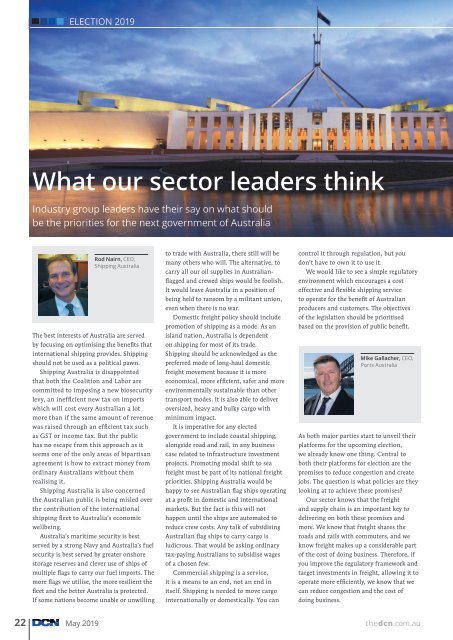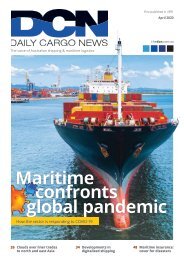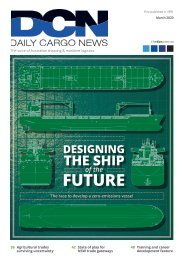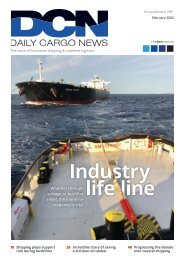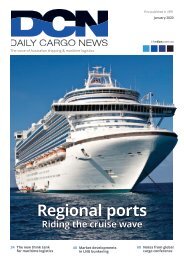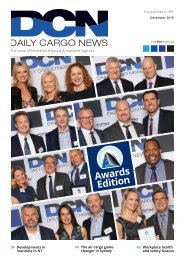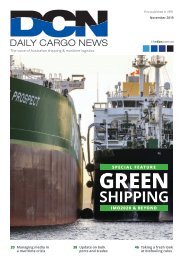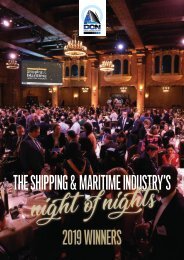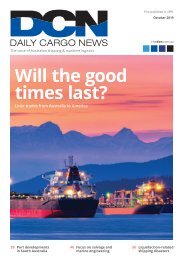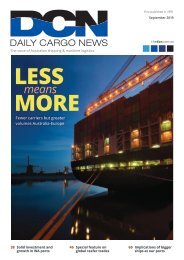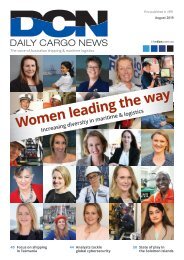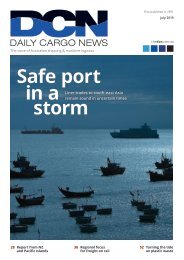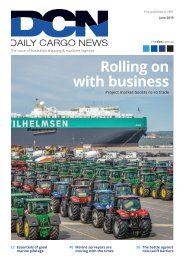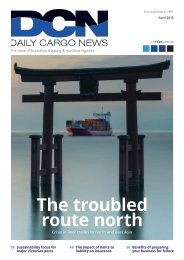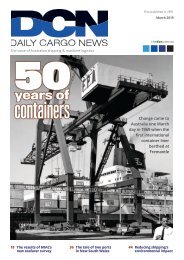DCN May Edition 2019
Create successful ePaper yourself
Turn your PDF publications into a flip-book with our unique Google optimized e-Paper software.
ELECTION <strong>2019</strong><br />
What our sector leaders think<br />
Industry group leaders have their say on what should<br />
be the priorities for the next government of Australia<br />
Rod Nairn, CEO,<br />
Shipping Australia<br />
The best interests of Australia are served<br />
by focusing on optimising the benefits that<br />
international shipping provides. Shipping<br />
should not be used as a political pawn.<br />
Shipping Australia is disappointed<br />
that both the Coalition and Labor are<br />
committed to imposing a new biosecurity<br />
levy, an inefficient new tax on imports<br />
which will cost every Australian a lot<br />
more than if the same amount of revenue<br />
was raised through an efficient tax such<br />
as GST or income tax. But the public<br />
has no escape from this approach as it<br />
seems one of the only areas of bipartisan<br />
agreement is how to extract money from<br />
ordinary Australians without them<br />
realising it.<br />
Shipping Australia is also concerned<br />
the Australian public is being misled over<br />
the contribution of the international<br />
shipping fleet to Australia’s economic<br />
wellbeing.<br />
Australia’s maritime security is best<br />
served by a strong Navy and Australia’s fuel<br />
security is best served by greater onshore<br />
storage reserves and clever use of ships of<br />
multiple flags to carry our fuel imports. The<br />
more flags we utilise, the more resilient the<br />
fleet and the better Australia is protected.<br />
If some nations become unable or unwilling<br />
to trade with Australia, there still will be<br />
many others who will. The alternative, to<br />
carry all our oil supplies in Australianflagged<br />
and crewed ships would be foolish.<br />
It would leave Australia in a position of<br />
being held to ransom by a militant union,<br />
even when there is no war.<br />
Domestic freight policy should include<br />
promotion of shipping as a mode. As an<br />
island nation, Australia is dependent<br />
on shipping for most of its trade.<br />
Shipping should be acknowledged as the<br />
preferred mode of long-haul domestic<br />
freight movement because it is more<br />
economical, more efficient, safer and more<br />
environmentally sustainable than other<br />
transport modes. It is also able to deliver<br />
oversized, heavy and bulky cargo with<br />
minimum impact.<br />
It is imperative for any elected<br />
government to include coastal shipping,<br />
alongside road and rail, in any business<br />
case related to infrastructure investment<br />
projects. Promoting modal shift to sea<br />
freight must be part of its national freight<br />
priorities. Shipping Australia would be<br />
happy to see Australian flag ships operating<br />
at a profit in domestic and international<br />
markets. But the fact is this will not<br />
happen until the ships are automated to<br />
reduce crew costs. Any talk of subsidising<br />
Australian flag ships to carry cargo is<br />
ludicrous. That would be asking ordinary<br />
tax-paying Australians to subsidise wages<br />
of a chosen few.<br />
Commercial shipping is a service,<br />
it is a means to an end, not an end in<br />
itself. Shipping is needed to move cargo<br />
internationally or domestically. You can<br />
control it through regulation, but you<br />
don’t have to own it to use it.<br />
We would like to see a simple regulatory<br />
environment which encourages a cost<br />
effective and flexible shipping service<br />
to operate for the benefit of Australian<br />
producers and customers. The objectives<br />
of the legislation should be prioritised<br />
based on the provision of public benefit.<br />
Mike Gallacher, CEO,<br />
Ports Australia<br />
As both major parties start to unveil their<br />
platforms for the upcoming election,<br />
we already know one thing. Central to<br />
both their platforms for election are the<br />
promises to reduce congestion and create<br />
jobs. The question is what policies are they<br />
looking at to achieve these promises?<br />
Our sector knows that the freight<br />
and supply chain is an important key to<br />
delivering on both these promises and<br />
more. We know that freight shares the<br />
roads and rails with commuters, and we<br />
know freight makes up a considerable part<br />
of the cost of doing business. Therefore, if<br />
you improve the regulatory framework and<br />
target investments in freight, allowing it to<br />
operate more efficiently, we know that we<br />
can reduce congestion and the cost of<br />
doing business.<br />
22 <strong>May</strong> <strong>2019</strong><br />
thedcn.com.au


